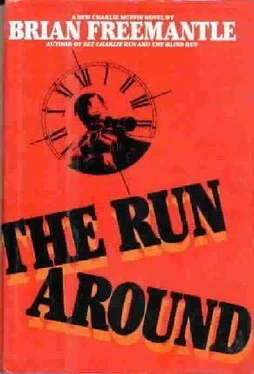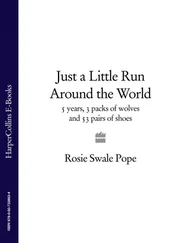Brian Freemantle - The Run Around
Здесь есть возможность читать онлайн «Brian Freemantle - The Run Around» весь текст электронной книги совершенно бесплатно (целиком полную версию без сокращений). В некоторых случаях можно слушать аудио, скачать через торрент в формате fb2 и присутствует краткое содержание. Жанр: Шпионский детектив, на английском языке. Описание произведения, (предисловие) а так же отзывы посетителей доступны на портале библиотеки ЛибКат.
- Название:The Run Around
- Автор:
- Жанр:
- Год:неизвестен
- ISBN:нет данных
- Рейтинг книги:3 / 5. Голосов: 1
-
Избранное:Добавить в избранное
- Отзывы:
-
Ваша оценка:
- 60
- 1
- 2
- 3
- 4
- 5
The Run Around: краткое содержание, описание и аннотация
Предлагаем к чтению аннотацию, описание, краткое содержание или предисловие (зависит от того, что написал сам автор книги «The Run Around»). Если вы не нашли необходимую информацию о книге — напишите в комментариях, мы постараемся отыскать её.
The Run Around — читать онлайн бесплатно полную книгу (весь текст) целиком
Ниже представлен текст книги, разбитый по страницам. Система сохранения места последней прочитанной страницы, позволяет с удобством читать онлайн бесплатно книгу «The Run Around», без необходимости каждый раз заново искать на чём Вы остановились. Поставьте закладку, и сможете в любой момент перейти на страницу, на которой закончили чтение.
Интервал:
Закладка:
Lubin smiled in instant recognition when Charlie produced again the photograph and said: ‘Drugs, isn’t it? That’s what the other policeman said.’
Lubin was enjoying the attention, after a lifetime of being ignored, guessed Charlie. He said: ‘The investigation is international; that’s why I’m here from England.’
‘Important then?’
‘Very much so. I’d like you to help me all you can.’
‘Of course,’ offered the man, eagerly.
‘He said his name was Klaus Schmidt?’
‘Yes.’
‘German?’
‘Certainly not Swiss-Deutsch.’
‘Why are you so certain?’
‘I know the accent, of course; the difference.’
‘Definitely German, then?’
Lubin put his head to one side, doubtfully. ‘There was an accent,’ he said. ‘In his German, I mean. A blur in some of the words that I had not encountered before. But it was very precise: very grammatical.’
‘As if it were a learned, carefully studied language you mean? Not his first or natural tongue?’
‘I suppose so,’ said the clerk. ‘Until you mentioned it, I hadn’t thought about it.’
‘He signed a registration card?’
‘Yes.’
‘With an address?’
‘Yes.’
‘What was it?’
‘I can’t remember,’ said Lubin. ‘The police took it.’
Another demand he could make upon Blom, thought Charlie. He said: ‘Tell me the system of registration?’
‘System?’
‘A guest has to complete a card?’ said Charlie, knowing how it was done from his booking into the Beau Rivage.
‘Yes,’ agreed the clerk.
Knowing the answer again from his own experience, Charlie said: ‘But isn’t it a requirement that the passport number is given and actually lodged, here at reception, at least overnight.’
Lubin trapped his lower lip between his teeth and visibly coloured. ‘Yes,’ he admitted.
‘But you didn’t do that?’
‘No,’ said the man, in further admission.
‘Why not?’
‘It was late when he arrived,’ said Lubin. ‘He complained at having travelled a long way and to be in a hurry to get to his room. And it’s such a time-wasting regulation: I’ve always found it so pointless.’
Until now, the very moment it mattered, thought Charlie. There was nothing to be gained by openly criticizing Lubin. Charlie said: ‘Tell me about him. What he looked like.’
Lubin did so hesitantly, someone anxious to compensate for an acknowledged mistake, determined to leave nothing out. Charlie counted off the descriptive points against those he already knew, slotting one set perfectly into the other. This was the man, thought Charlie; he could smell it! Coming to the most important part of the interview, Charlie said: ‘I want you to take your time, don’t hurry. But tell me what he was carrying.’
Lubin sniggered a laugh, as if he found the question amusing. He said: ‘A suitcase, of course.’
‘Only a suitcase?’
‘Yes.’
‘No briefcase?’
‘No.’
‘A shoulder grip maybe?’
‘Nothing more than a suitcase.’
‘What sort?’
‘The type made from some solid plastic, to prevent any pressure on the clothes.’
‘What colour?’
‘Grey,’ said Lubin. ‘They always seem to be grey.’
‘How large?’
The night clerk extended his arms sideways and then held his right hand palm down, in a measuring gesture approximately four feet by three feet and said: ‘Something like that.’
‘Quite small then?’
‘Enough for maybe one suit, a change of shirt and underwear, perhaps,’ said the man. ‘That’s why I remembered his remark about going on to New York. I thought at the time he seemed to be travelling very light.’
Charlie smiled at the irony of the other man using the word. He said: ‘Who carried the bag to his room, that night when he booked in?’
‘I did,’ said Lubin.
Charlie sighed, relieved: maybe a break at last. He said: ‘How heavy was it?’
Lubin shrugged. ‘Just a suitcase.’
‘Heavy? The sort of weight you’d encountered a lot before? Or light?’ insisted Charlie.
Lubin considered the question, smiling again. ‘Actually,’ he recalled, ‘it was quite light.’
Charlie let go some more held breath. ‘And he didn’t object to you carrying it?’
‘He seemed to expect it,’ said Lubin.
Charlie said: ‘Tell me about his demeanour. How did he treat you?’
‘Treat me?’ Lubin appeared confused by the question.
‘Did you consider him polite?’
Once more Lubin did not react at once. Then he said: ‘He was very direct.’
‘Direct?’ echoed Charlie. ‘Would some people have considered his attitude rude?’
‘Possibly,’ agreed the clerk. Then, with longer reflection, he added: ‘Yes, I suppose he could have been considered rude.’
Already knowing the arrival time of the Swissair flight, Charlie said: ‘What time did he get here, the night he booked in?’
‘It’s difficult to remember accurately,’ qualified Lubin. ‘Nine-thirty, probably nearer to ten o’clock.’
Which would accord close enough with flight 837, Charlie decided. He said: ‘He complained of travelling a long way?’
‘Yes.’
‘But didn’t say from where?’
‘No.’
‘Did he look tired?’
‘Not really. I didn’t think so.’
‘Did he ask for any food?’
‘No.’
‘Is there a room bar?’
Lubin smiled apologetically. ‘The hotel isn’t quite of that standard.’
‘So did he ask for a drink?’
‘No.’
‘Just went directly to his room and stayed there?’
‘On both nights,’ confirmed the man.
‘What about a tip for carrying his bags?’
‘It’s odd that you should ask that,’ said Lubin.
Which was why I posed it, on the off-chance, thought Charlie. Encouragingly he said: ‘What was odd about the tip?’
‘He was very careful about it: gave me exactly fifteen per cent. Counted it out, coin for coin. People don’t often do that, not coin for coin.’
‘No,’ said Charlie. ‘They don’t, do they?’ Then he said: ‘Tell me, in as few words as possible, how he came across to you: the sort of man, I mean?’
There was a by now familiar pause for consideration. Eventually Lubin said. ‘Ready.’
‘Ready?’ queried Charlie, curious at the man’s expression.
‘Even in a hotel like this there is usually a kind of uncertainty you can detect in a person. They’re away from home, in a place they don’t know, a place they’re unsure of. So there’s an uncertainty. But with him there wasn’t. That’s what I mean by ready. He seemed quite confident: that he could cope with whatever difficulties he might come up against.’
‘He probably believes he can,’ said Charlie, distantly.
‘This drugs business,’ said Lubin, ‘is it very serious? Might it get in the newspapers even?’
‘It’s very serious,’ said Charlie. Again, a remark for his own benefit. He went on: ‘And it should get in the newspapers.’
‘Could I be a witness?’ asked the little clerk at once, his need obvious.
‘If it gets to any sort of case, I’ll see that you’re called,’ offered Charlie.
‘I’d like that,’ said Lubin. ‘Thank you.’
Charlie wrote his name and the 31-02-21 telephone number of the Beau-Rivage on a piece of Bellevue note-paper and said: ‘I want you to make me a promise. If he comes back I want you to call me at this number. Will you do that for me?’
‘Of course,’ undertook Lubin. ‘What about the Swiss authorities?’
‘Did they leave a number for you to call?’
‘No,’ said Lubin.
‘You tell me and I’ll tell them,’ said Charlie at once. For all the effort the Swiss appeared to be putting into this the bastard could be driving around the streets in a tank with a hammer and sickle on the side and playing the Moscow Top Ten on its tape deck.
Читать дальшеИнтервал:
Закладка:
Похожие книги на «The Run Around»
Представляем Вашему вниманию похожие книги на «The Run Around» списком для выбора. Мы отобрали схожую по названию и смыслу литературу в надежде предоставить читателям больше вариантов отыскать новые, интересные, ещё непрочитанные произведения.
Обсуждение, отзывы о книге «The Run Around» и просто собственные мнения читателей. Оставьте ваши комментарии, напишите, что Вы думаете о произведении, его смысле или главных героях. Укажите что конкретно понравилось, а что нет, и почему Вы так считаете.












